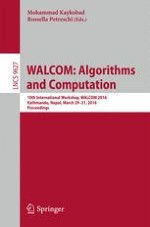2016 | OriginalPaper | Buchkapitel
A General Framework for Searching on a Line
verfasst von : Prosenjit Bose, Jean-Lou De Carufel
Erschienen in: WALCOM: Algorithms and Computation
Verlag: Springer International Publishing
Aktivieren Sie unsere intelligente Suche, um passende Fachinhalte oder Patente zu finden.
Wählen Sie Textabschnitte aus um mit Künstlicher Intelligenz passenden Patente zu finden. powered by
Markieren Sie Textabschnitte, um KI-gestützt weitere passende Inhalte zu finden. powered by
